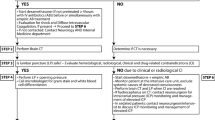Abstract
Bacterial meningitis is an important cause of morbidity and mortality in the United States and throughout the world. The diagnosis of bacterial meningitis is often delayed in patients as a result of numerous factors such as length of illness, use of radiologic imaging studies, and/or prior use of antimicrobial agents. Many textbooks emphasize the need for prompt initiation of antimicrobial therapy in a patient with suspected acute bacterial meningitis to prevent many of the long-term sequelae associated with this disorder. We have reviewed the literature to determine if there is a standard of care for timing of administration of antimicrobial therapy in patients with a diagnosis of acute bacterial meningitis. Although the clinical data are inconclusive, it makes intuitive sense to initiate antimicrobial therapy as soon as possible in any patient with suspected or proven bacterial meningitis before the patient’s illness advances to a high level of clinical severity, beyond which antimicrobial therapy is less likely to be of benefit. However, clinical experiences suggest that patient outcome in bacterial meningitis is a result of multiple factors, since some patients treated within a few hours of symptoms develop an adverse outcome whereas others who are symptomatic for days prior to presentation suffer no adverse sequelae.
Similar content being viewed by others
References and Recommended Reading
Schuchat AS, Robinson K, Wenger JD, et al.: Bacterial meningitis in the United States in 1995. N Engl J Med 1997, 337:970–976.
Bryan JP, de Silva HR, Tavares A, Scheld WM: Etiology and mortality of bacterial meningitis in northeastern Brazil. Rev Infect Dis 1990, 12:128–135.
Pfister HW, Feiden W, Einhaupl KM: Spectrum of complications during bacterial meningitis in adults: results of a prospective clinical study. Arch Neurol 1993, 50:575–581.
Radetsky M: Duration of symptoms and outcome in bacterial meningitis: an analysis of causation and the implications of a delay in diagnosis. Pediatr Infect Dis J 1992, 11:694–698.
Bonadio WA: Medical-legal considerations related to symptom duration and patient outcome after bacterial meningitis. Am J Emerg Med 1997, 15:420–423. An excellent review of 27 studies including 5585 patients that compared duration of symptoms before initiation of antimicrobial therapy with outcome. The author suggested that the duration of meningitis, not the duration of symptoms, was the critical determinant in assessing outcome.
Strang JR, Pugh EJ: Meningococcal infections: reducing the case fatality rate by giving penicillin before admission to the hospital. Br Med J 1992, 305:141–143.
Cartwright K, Reilly S, White D, et al.: Early treatment with parenteral penicillin in meningococcal disease. Br Med J 1992, 305:143–147.
Jones DM, Kaczmarski EB: Meningococcal infections in England and Wales: report of the Meningococcal Disease Reference Laboratory for 1990. Commun Dis Rep 1991, 1:R76-R78.
The Research Committee of the British Society for the Study of Infection: Bacterial meningitis: causes for concern. J Infect 1995, 30:89–94.
Begg N, Cartwright KAV, Cohen J, et al.: Consensus statement on diagnosis, investigation, treatment and prevention of acute bacterial meningitis in immunocompetent adults. J Infect 1999, 39:1–15.
Begg N: Reducing mortality from meningococcal disease. Give antibiotics before admission. Br Med J 1992, 305:133–134.
Aronin SI, Peduzzi P, Quagliarello VJ: Community-acquired bacterial meningitis: risk stratification for adverse clinical outcome and effect of antibiotic timing. Ann Intern Med 1998, 129:862–869. A retrospective cohort study of 269 adults with community-acquired bacterial meningitis to determine whether timing of antimicrobial administration influenced patient outcome. The authors found that patients who advanced to a high level of clinical severity after presentation to the emergency room and before initiation of antimicrobial therapy had a statistically significant higher risk of adverse clinical outcome compared with those who remained in their original prognostic stage.
Bonsu BK, Harper MB: Fever interval before diagnosis, prior antibiotic treatment, and clinical outcome for young children with bacterial meningitis. Clin Infect Dis 2001, 32:566–572. A retrospective review of 288 young children with bacterial meningitis that examined fever interval, prior antimicrobial treatment, and clinical outcome. The subset of patients with pneumococcal meningitis who were treated with antimicrobial therapy prior to a diagnosis had a reduced rate of meningitisrelated complications.
Winkelstein JA: The influence of partial treatment with penicillin on the diagnosis of bacterial meningitis. J Pediatr 1970, 77:619–624.
Jarvis CW, Saxena KM: Does prior antibiotic treatment hamper the diagnosis of acute bacterial meningitis? An analysis of a series of 135 childhood cases. Clin Pediatr 1972, 11:201–204.
Kilpi T, Anttila M, Kallio MJ, Peltola H: Length of prediagnostic history related to the course and sequelae of childhood bacterial meningitis. Pediatr Infect Dis J 1993, 12:184–188.
Kaplan SL, Smith EO, Wills C, Feigin RD: Association between preadmission oral antibiotic therapy and cerebrospinal fluid findings and sequelae caused by Haemophilus influenzae type b meningitis. Pediatr Infect Dis 1986, 5:626–632.
Tunkel AR: Bacterial Meningitis. Philadelphia: Lippincott, Williams & Wilkins; 2001.
Feigin RD, Kaplan SL: Commentary. Pediatr Infect Dis J 1992, 11:698–700.
Goodman JM: Commentary: legal aspects of bacterial meningitis. Pediatr Infect Dis J 1992, 11:700–701.
Bryan CS, Reynolds KL, Crout L: Promptness of antibiotic therapy in acute bacterial meningitis. Ann Emerg Med 1986, 15:544–557.
Talan DA, Guterman JJ, Overturf GD, et al.: Analysis of emergency department management of suspected bacterial meningitis. Ann Emerg Med 1989, 18:856–862.
Talan DA, Zibulewsky J: Relationship of clinical presentation to time to antibiotics for the emergency department management of suspected bacterial meningitis. Ann Emerg Med 1993, 22:1733–1738.
Meadow WL, Lantos J, Tanz RR, et al.: Ought “standard care” be the “standard of care”? A study of time to administration of antibiotics in children with meningitis. Am J Dis Child 1993, 147:40–44.
Author information
Authors and Affiliations
Rights and permissions
About this article
Cite this article
Short, W.R., Tunkel, A.R. Timing of administration of antimicrobial therapy in bacterial meningitis. Curr Infect Dis Rep 3, 360–364 (2001). https://doi.org/10.1007/s11908-001-0076-6
Issue Date:
DOI: https://doi.org/10.1007/s11908-001-0076-6




